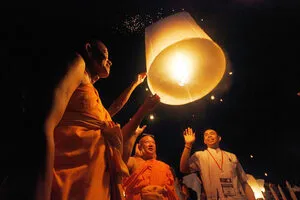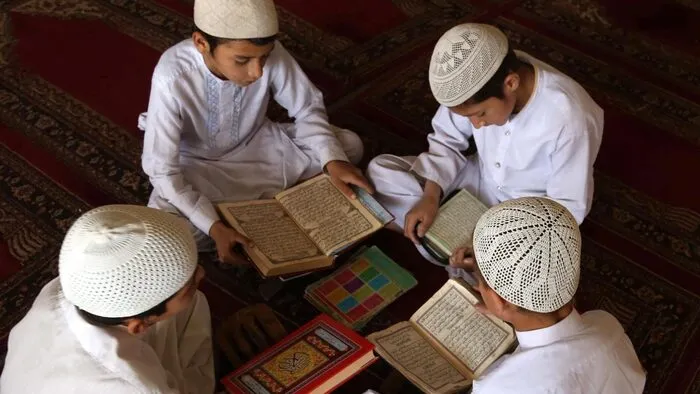Sacred dates are fundamental moments for religious and spiritual practice in different cultures around the world. These dates mark significant events in the history of a religion, celebrations of deities, or the natural cycles of the Earth.
Adverts
Such celebrations may include rituals, festivities and sacred practices that bring communities together, strengthening social bonds and transmitting values and traditions across generations.
This text explores the sacred dates of five major religious traditions: Christianity, Islam, Judaism, Hinduism and Buddhism.
Each of these traditions has its own calendar and set of rituals that not only honor their sacred teachings but also serve as a reminder of their rich historical and spiritual heritage.
Sacred Dates for Christianity
In Christianity, dates such as Easter, which celebrates the resurrection of Jesus Christ, and Christmas, which commemorates his birth, are of profound importance.
Holy Week, which precedes Easter, includes days such as Good Friday, marking Jesus' crucifixion, and Palm Sunday, which commemorates his entry into Jerusalem.
Other significant dates include Pentecost, celebrating the descent of the Holy Spirit upon the apostles. In addition to these, the Ascension of Jesus, occurring 40 days after Easter, commemorates his ascension to heaven, and Advent, the period of preparation for Christmas, stand out for their reflective and expectant nature.
These celebrations not only recall biblical events but also offer moments of renewal of faith and community practices, strengthening ties between believers and encouraging the living of Christian principles in everyday life.
Islam
Islam observes Ramadan, a month of fasting and reflection that commemorates the revelation of the Quran to the Prophet Muhammad. This period is considered extremely sacred as it is when Muslims draw closer to God through intense prayer, reading the Quran and charity.
Fasting, from sunrise to sunset, teaches discipline, self-sacrifice, and empathy for those less fortunate. Eid al-Fitr marks the end of Ramadan with festivities and prayers, where communities come together to celebrate the conclusion of a month of spiritual reflection and renewal.
Another sacred moment is Eid al-Adha, which coincides with the annual pilgrimage to Mecca (Hajj), one of the five pillars of Islam and a religious duty that every Muslim must fulfill, if they have the means to do so.
This festival celebrates Abraham's willingness to sacrifice his son Ishmael as an act of obedience to God, according to Islamic tradition.
The story highlights themes of faith, obedience and sacrifice and is commemorated with the sacrifice of an animal, usually a lamb or goat. The meat is divided among family, friends and those in need, symbolizing sharing and gratitude.
Holy Days for Judaism
The Jewish calendar is filled with holy days, with Rosh Hashanah marking the Jewish New Year, and Yom Kippur, the Day of Atonement, being a time of intense reflection and fasting. The Jewish Passover (Pesach) commemorates the liberation of the Israelites from slavery in Egypt.
Other festivals include Sukkot, which celebrates divine protection during the Israelites' 40-year journey through the desert, and Hanukkah, which commemorates the rededication of the Temple in Jerusalem.
Additionally, Simchat Torah celebrates the completion and resumption of the annual Torah reading, promoting an ongoing connection with sacred texts. Purim commemorates the salvation of the Jews in ancient Persia, as recounted in the Book of Esther, and is marked by festivities and the public reading of the Megillah.
Each of these holy days not only commemorates historical events, but also strengthens the identity and continuity of the Jewish community around the world.
Hinduism
In Hinduism, Diwali, the festival of lights, celebrates the victory of good over evil and light over darkness, being one of the brightest and happiest festivals. It is common to burn fireworks and light lamps, symbolizing the light that protects against spiritual darkness.
Holi, known as the festival of colors, marks the arrival of spring and is an explosion of colors and joy, where people throw colored powders at each other, symbolizing the victory of good, fertility and love.
It is also an occasion to renew friendships and resolve conflicts, reflecting the essence of forgiveness and reconciliation.
Other important dates include Navaratri, a nine-night festival dedicated to the worship of the goddess Durga, who represents the destruction of evil and protection against negative forces.
During this time, devotees fast and perform rituals to invoke the goddess's spiritual strength. Maha Shivaratri is another sacred moment, dedicated to the god Shiva, the transformer.
Buddhism and its Sacred Dates
Vesak, or Buddha's Day, is the holiest of Buddhist dates, celebrating the birth, enlightenment and death of Gautama Buddha. It is a time of joy, meditation and rededication to Buddhist teachings.
This day is marked by various devotional practices, such as visits to temples, offerings of flowers and candles, and the liberation of animals as an act of compassion. Additionally, many Buddhists participate in Buddha statue bathing ceremonies, symbolizing the purification of the heart and mind.
Vesak is also an opportunity for followers to reaffirm their commitment to Buddhist principles such as non-violence and world peace.

Other celebrations include Asalha Puja, which marks Buddha's first sermon and the beginning of the Dharma wheel, and Magha Puja, which commemorates a historic encounter between Buddha and his disciples.
These events are not just religious celebrations, but also moments of deep reflection on the teachings of Buddha and how they can be applied in daily life to promote harmony and understanding between people.
Conclusion
Sacred dates in religions reflect the richness and diversity of spiritual traditions around the world. They not only mark important historical events, but are also times of reunion, renewal and spiritual reflection for millions of people.
Observance of these dates allows believers to connect with their faith in deeply meaningful ways, strengthening community and cultural continuity. Each festival is a window into the worldview and values of a religious tradition, offering a glimpse into its spiritual heart and devotional practices.
Furthermore, celebrations help to transmit moral and ethical teachings, strengthening intergenerational ties and promoting a sense of belonging and collective identity.
These events often attract not only those who practice the faith, but also curious people and tourists, contributing to intercultural dialogue and tolerance between different peoples and nations. Celebrations are therefore crucial not only for the maintenance of tradition, but also as a tool for peace and global understanding.



